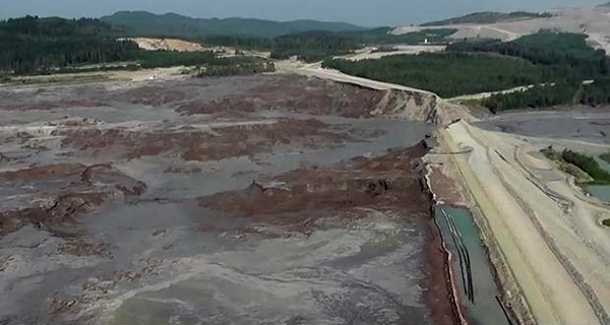British Columbia is one of the country's biggest mineral producers. But compared to Americans, British Columbians have very little information about the safety and regulation of that activity.
And that means journalists, activists and citizens have very little power to stop mining problems before they become mining disasters.
Just such a disaster happened last month when the tailing dam at Imperial Metals Corp.'s Mount Polley Mine collapsed, resulting in a flood of concern and questions about safety at similar operations in the province.
In response to a request from Vancouver Sun reporter Gordon Hoekstra, the government released details on the 49 "dangerous or unusual occurrences" that were recorded as happening at tailing ponds in British Columbia between 2000 and 2012.
Earlier, it also released a summary of inspections at the Mount Polley mine. But a spokesperson for the Ministry of Energy and Mines confirmed the government "does not generally publicly post mine inspection reports or related information, including the dates on which they were conducted."
The reason: such reports, which can be obtained via the province's sometimes-lengthy and often frustrating freedom of information request process, "need to be reviewed for any personal and financial information before they can be released."
Holes in Canadian databases
The government also hasn't released details on the "dangerous or unusual occurrences" that were recorded as happening at mining locations other than tailing ponds between 2001 and 2012. Those occurrences, according to aggregate statistics released as part of the chief inspector of mines' annual report, include 1,173 incidents at pits, 287 incidents at plants or mills, 178 incidents at maintenance shops, etc.
When asked whether the province discloses any other information about health, safety and environmental violations at mines in British Columbia, a ministry spokesperson stated the government does post overviews of significant spills of oil or hazardous material. "From time to time, and as appropriate" it may post hazard alerts about incidents at mines "when relevant on a broader scale."
The federal governments also maintain databases listing some of their environmental offenders. But both have major limitations. For example, the provincial database doesn't include those who have violated British Columbia's Mines Act. And the federal database, which has just 78 entries, only includes convictions of corporations obtained via court proceedings. It doesn't include tickets, warning letters or compliance orders issued to them.*
US approach far more transparent
By comparison, the haul of information about mines in the United States is considerably richer.
The federal Mine Safety and Health Administration has a database that includes statistics and reports about past and present health and safety accidents, inspections and violations at individual mines. And the Environmental Protection Agency has a similar database detailing environmental inspections and violations at those operations.
That means Americans, with just a few keystrokes, can find out there were four injuries at Imperial Metals' Sterling Mining in Nevada between 2012 and 2014, including a "serious abrasion to thumb," a "tibia fracture" and a head laceration.
They also can find out there have been six health and safety inspections at that mine so far this year, during which 13 violations of the Mine Act were cited with penalties and proposed penalties totaling $4,764.
And they can find out the last Resource Conservation and Recovery Act inspection of Toronto-based Barrick Gold Corp.'s Goldstrike Mine, which is also located in Nevada, took place on May 14 and that the operation is currently listed as being in "significant violation" of that legislation.
BC needs to catch up
There is absolutely no reason why British Columbians shouldn't be similarly informed about our own mines -- except for our willingness to elect governments on both the left and right that exploit our political complacency and infantilism.
After all, how many citizens do you think will put information rights as their top issue the next time they go to the polls? And how many even care about those rights between elections?
But without such information it's impossible for British Columbians to know how safe our mines are -- and whether officials are doing enough to keep those operations safe.
Journalists and activists just don't know what we don't know.
Instead, we have to trust that our Father Knows Best government will take care of its citizen-children at the expense of the powerful who are its friends and financiers.
And that's exactly the way most politicians, once they get into power, seem to like it.
* = Imperial Metals doesn't show up in either database. ![]()
Read more: BC Politics, Environment
















Tyee Commenting Guidelines
Comments that violate guidelines risk being deleted, and violations may result in a temporary or permanent user ban. Maintain the spirit of good conversation to stay in the discussion.
*Please note The Tyee is not a forum for spreading misinformation about COVID-19, denying its existence or minimizing its risk to public health.
Do:
Do not: